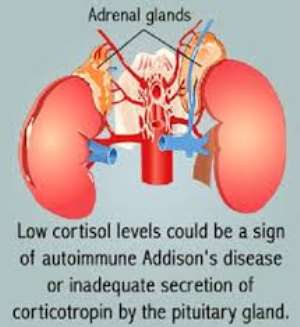
Cortisol is a hormone produced by the human body which counteracts inflammations and allergies. Among others, it restricts helper cells activity and transfers them from the active blood circulation to the dormant area of the bone marrow.
Where the hormone balance is stable, a daily rhythm regulates the cortisol level in the blood, which in turn determines the daily rhythm of the helper cells in the blood. The cortisol level is highest at 6 AM, by the lunchtime it has dropped sharply and only starts to rise again slowly from the midnight onwards.
The cortisol level in the blood of HIV-infected patients is higher than that of non-infected persons. All examinations based on 24-hour rhythm produced higher values. There are fewer helper cells as a result of the raised cortisol level on the blood of the patients affected by Aids or who bare in a possibly preliminary stage of the disease.
Of decisive significance, is the changing of the rhythm of cortisol production. The cortisol level of Aids patients is constantly raised, even during the night. A sustained increase of cortisol, to a small degree, produces a particularly marked reduction in the quantity of T cells in the blood.
The Human Immunodeficiency Virus manages to upset the central regulation. The organism is taken in by the structure of HIV. On one hand, it figures to face Neuro-Lukin VIP, which is produced by the helper cells, and on the other hand, it figures to face its own hormone alphal-thymosine-alphal, while in reality, it is facing HIV-core protein.
Deception of the immunosystem, thus; sets in motion a chain reaction: the Corticotropin-Releasing Hormone (CRH), yielded and scattered in error leads to increased release of the Adrenocorticotropic Hormone (ACTH). Because of ACTH, the adrenal glands increase the production of cortisol.
The cortisol then brings the organism to a state of partial immunodeficiency: agents of Aids diseases can now strike because the immunoreaction to unknown agents is impaired. (Against well-known agents several protecting mechanisms, which can not be influenced by cortisol, were developed.
An effect of feedback in healthy subjects is the cortisol impedes the production of CRH, signaling substance which has set this mechanism in motion. However, with Aids, the feedback effect is cancelled out once again because of production of ACTH at other places: leukocytes and lymphocytes being attacked by the virus release ACTH, which stimulates cortisol production.
And HIV-infected monocytes stimulate even by themselves the adrenal glands to produce cortisol. HIV increases the amount of cortisol and cortisol accelerates as a growth substance for HIV.




 Lay KPMG audit report on SML-GRA contract before Parliament – Isaac Adongo tells...
Lay KPMG audit report on SML-GRA contract before Parliament – Isaac Adongo tells...
 Supervisor remanded for stabbing businessman with broken bottle and screwdriver
Supervisor remanded for stabbing businessman with broken bottle and screwdriver
 NDC watching EC and NPP closely on Returning Officer recruitment — Omane Boamah
NDC watching EC and NPP closely on Returning Officer recruitment — Omane Boamah
 Your decision to contest for president again is pathetic – Annoh-Dompreh blasts ...
Your decision to contest for president again is pathetic – Annoh-Dompreh blasts ...
 Election 2024: Security agencies ready to keep peace and secure the country — IG...
Election 2024: Security agencies ready to keep peace and secure the country — IG...
 People no longer place value in public basic schools; new uniforms, painting wil...
People no longer place value in public basic schools; new uniforms, painting wil...
 'Comedian' Paul Adom Otchere needs help – Sulemana Braimah
'Comedian' Paul Adom Otchere needs help – Sulemana Braimah
 Ejisu by-election: Only 33% of voters can be swayed by inducement — Global InfoA...
Ejisu by-election: Only 33% of voters can be swayed by inducement — Global InfoA...
 Minority will expose the beneficial owners of SML, recover funds paid to company...
Minority will expose the beneficial owners of SML, recover funds paid to company...
 Prof. Opoku-Agyemang has ‘decapitated’ the NPP’s strategies; don’t take them ser...
Prof. Opoku-Agyemang has ‘decapitated’ the NPP’s strategies; don’t take them ser...
